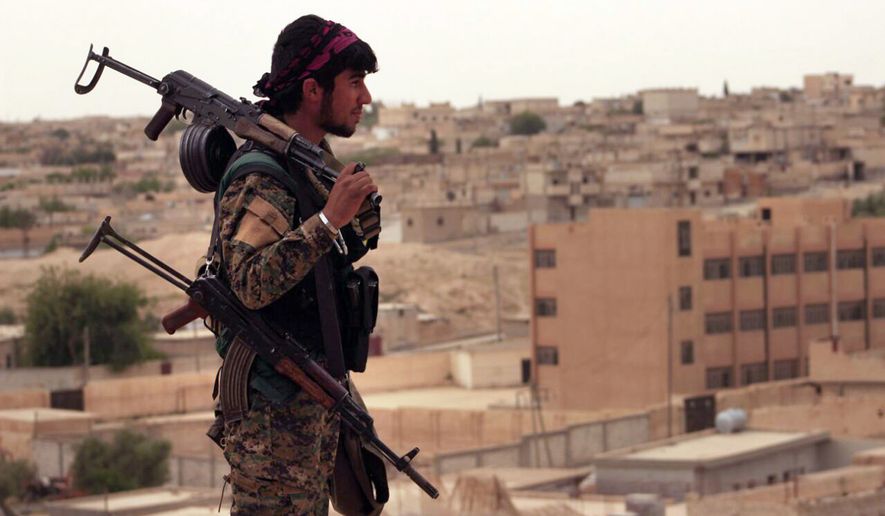President Trump has given the Pentagon the green light to directly provide arms and heavy weapons to Kurdish militias battling the Islamic State in Syria, defying staunch opposition from NATO ally Turkey, which considers some of those militias as terrorist groups.
The move comes just before a scheduled visit by Turkish President Recep Tayyip Erdogan to Washington next week. Mr. Erdogan has routinely lambasted the White House for its battlefield support of Kurdish groups such as Kurdish People’s Protection Units, or YPG, which he argues have links to Kurdish separatist movements inside Turkey.
But the YPG is a critical part of the U.S.-backed Syrian Democratic Forces or SDF — the consortium of Syrian Kurdish and Arab militias battling ISIS. The SDF is expected to spearhead the coming assault on the Islamic State de facto capital of Raqqa.
YPG elements could receive mortars, heavy machine guns and armored tactical vehicles as part of the Trump administration’s plan, The Associated Press reports.
The Obama administration had approved military support for the YPG and other Kurdish militias in early 2015, as they fought to drive ISIS from the Syrian town of Kobane, which straddles the Turkish border. But that support was passed along through allied forces and not directly from the Pentagon, ostensibly over concerns direct support would anger Turkey, a NATO ally.
But as the endgame in Syria looms, Mr. Trump’s decision to openly arm YPG elements in Syria is designed to “ensure a clear victory over ISIS” in the country, said Pentagon Press Secretary Dana White.
The SDF, including its Kurdish elements, “are the only force on the ground that can successfully seize Raqqa in the near future,” she said in a statement announcing the plan.
“We are keenly aware of the security concerns of our coalition partner Turkey. We want to reassure the people and government of Turkey that the U.S. is committed to preventing additional security risks and protecting our NATO ally,” she added.
Meanwhile at the White House, spokesman Sean Spicer told reporters Tuesday that he was unsure whether Mr. Trump had informed Mr. Erdogan of his decision.
“I don’t know if he’s addressed this to the president yet,” Mr. Spicer said.
“The U.S. continues to prioritize support for Arab elements of the SDF. Raqqa and all liberated territories should return to the governance of local Syrian Arabs,” he added.
Officials from the Turkish embassy in Washington did not respond to requests for comment regarding the YPG arms deal. However, over the last several weeks, Ankara has conducted a unilateral air campaign against Kurdish targets in Syria. The strikes were part of an ongoing counterterrorism operation targeting members of the YPG.
Last Wednesday, Ilnur Cevik, a senior aide to Mr. Erdogan, said American forces working with members YPG could be in danger of being hit by Turkish fighters patrolling the volatile border region with Syria. He later tried to walk back his comments, saying, “Turkey has never and will never hit its allies anywhere, and that includes the U.S. in Syria.”
Turkey is a critical ally in the Islamic State fight, with its Incirlik Airbase a critical jumping-off point for attacks inside Syria. Defense Secretary Jim Mattis, talking to reporters in Denmark Tuesday after meeting with coalition members, said he had had good discussions with his Turkish counterparts this week and predicted Washington and Ankara would be able to contain the strains in the alliance.
“Our intent is to work with the Turks, alongside one another, to take Raqqa down, and we’re going to sort it out and we’ll figure out how we’re going to do it,” Mr. Mattis said.
But Bulent Aliriza, director of the Turkey Project at the Center for Strategic and International Studies, said the Trump administration’s argument are “unlikely to mollify Ankara’s anger.” A Turkish military delegation was in Washington this week making the case against arming the Kurdish fighters, Mr. Aliriza noted, and Mr. Erdogan was expected to press the case again when he comes to Washington.
• Carlo Muñoz can be reached at cmunoz@washingtontimes.com.




Please read our comment policy before commenting.